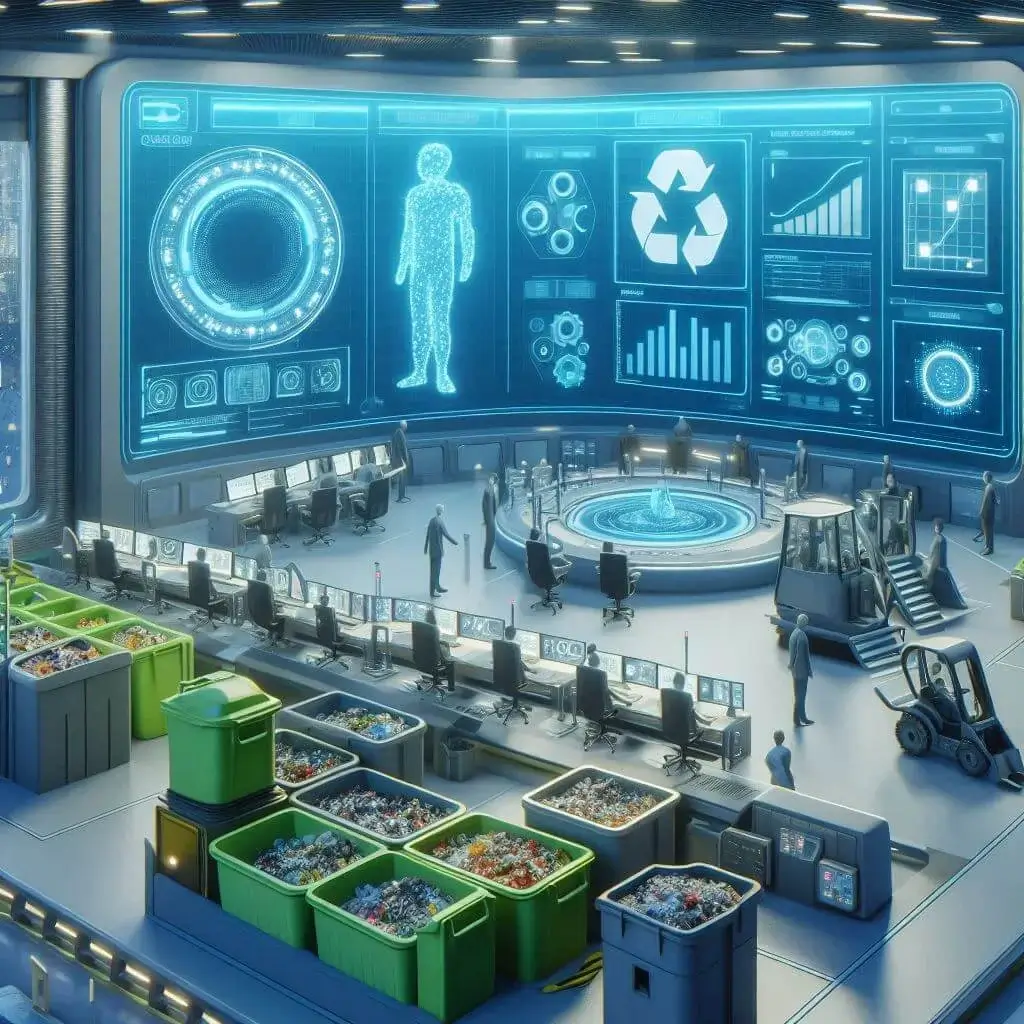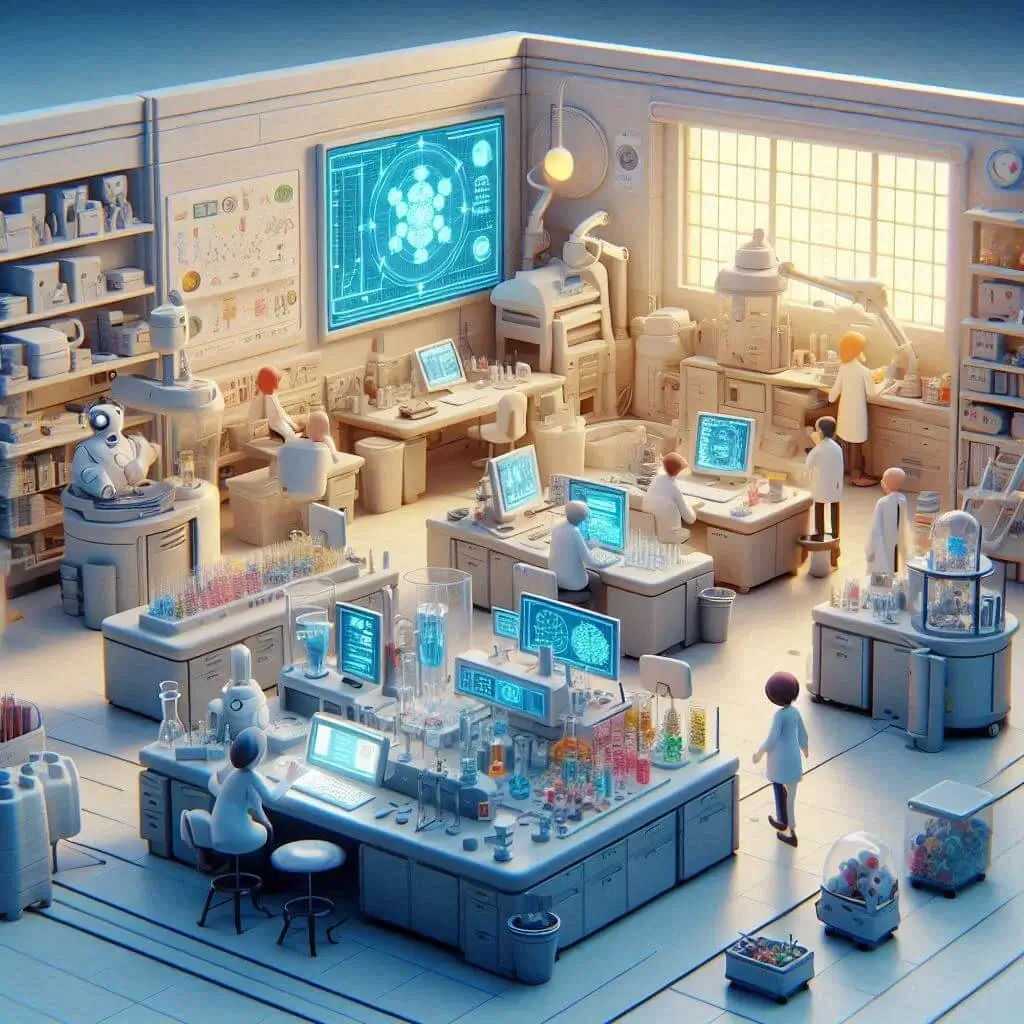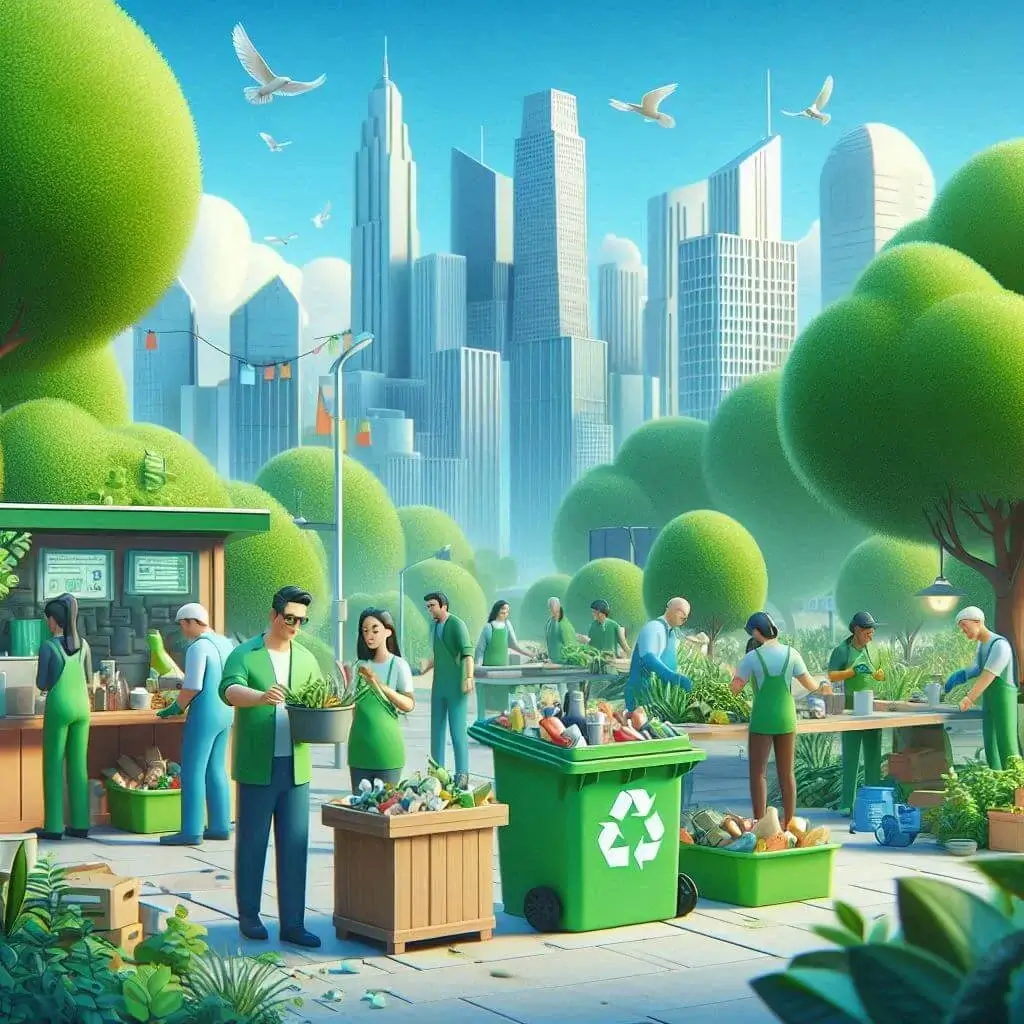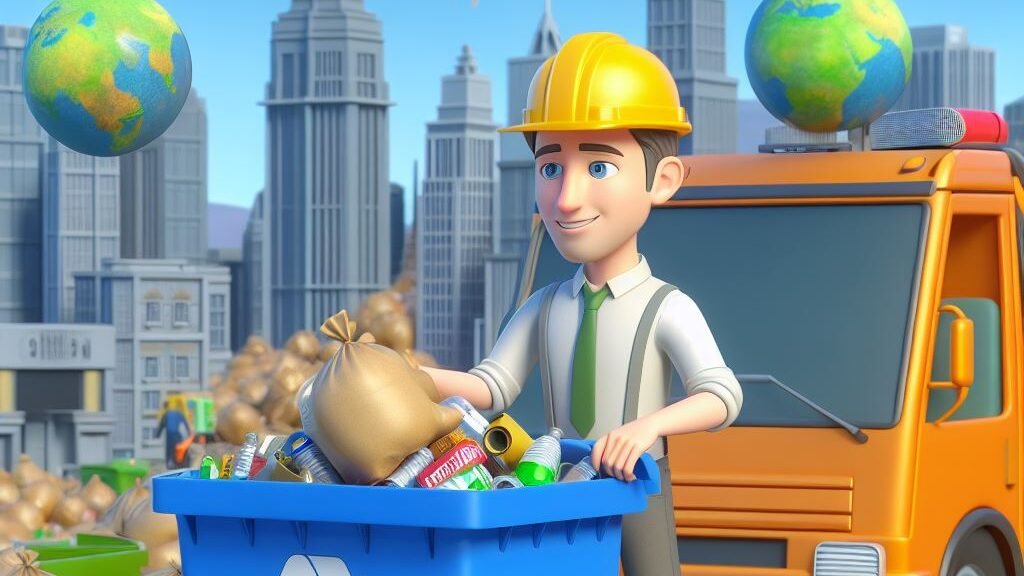The Future of Waste Management Careers
Are you curious about the future of waste management careers? As the world becomes more environmentally conscious, opportunities in sustainability and resource conservation are on the rise. In today’s fast-paced and increasingly populated world, the need for effective waste management is greater than ever before. From recycling and waste reduction to renewable energy and innovative technologies, the field of waste management is constantly evolving.
In this article, we will explore the exciting prospects that lie ahead for waste management professionals. We will delve into the various career paths available, highlighting the skills and qualifications necessary to succeed in this dynamic industry. Whether you are starting your career or looking to make a career change, this guide will provide valuable insights to help you navigate the ever-changing landscape of waste management.

Join us on this journey as we uncover the latest trends, technologies, and job opportunities that the future holds for waste management careers. Together, we can unlock the potential for a more sustainable and resource-efficient world.
The Growing Importance of Sustainability and Resource Conservation
In recent years, there has been a significant shift in global consciousness towards sustainability and resource conservation. The detrimental effects of climate change and environmental degradation have prompted individuals, businesses, and governments to take action. As a result, waste management has emerged as a critical component of sustainable development.
One of the key reasons behind the growing importance of waste management is the sheer volume of waste being generated. With the global population on the rise and urbanization accelerating, the amount of waste produced is increasing exponentially. This presents a significant challenge in terms of disposal, as traditional landfill methods are no longer viable in the long term.
To address this challenge, waste management professionals are implementing innovative strategies to minimize waste generation and maximize resource recovery. Recycling programs, waste-to-energy technologies, and composting initiatives are just a few examples of the sustainable practices being adopted. These efforts not only reduce the environmental impact of waste but also create economic opportunities by turning waste into valuable resources.
Current Challenges in Waste Management
While progress has been made in the field of waste management, several challenges still need to be overcome. One of the major challenges is the lack of awareness and education regarding proper waste disposal and recycling. Many individuals and communities are still unaware of the importance of waste management and continue to dispose of waste in an unsustainable manner.
Another challenge is the inadequate infrastructure for waste management in certain regions. Developing countries, in particular, face significant barriers in establishing effective waste management systems. Limited financial resources, lack of technological capabilities, and insufficient government support hinder progress in these areas.
Furthermore, the ever-increasing complexity of waste streams poses a challenge for waste management professionals. With the rise of electronic waste, hazardous materials, and plastic pollution, the need for specialized knowledge and expertise is paramount. Waste management professionals must stay up-to-date with the latest regulations and technologies to effectively handle these diverse waste streams.
Despite these challenges, the future of waste management careers is filled with opportunities for those willing to address these pressing issues head-on. Let’s explore what lies ahead.
The Future of Waste Management Careers
The future of waste management careers is promising, with a wide range of opportunities available in various sectors. From waste reduction and recycling to renewable energy and sustainable materials management, waste management professionals are at the forefront of building a more sustainable future.
One of the key areas of growth in waste management is recycling. As the demand for recycled materials increases, there is a need for professionals who can develop and implement recycling programs. These programs aim to divert waste from landfills and transform it into valuable resources. Recycling specialists work closely with businesses, communities, and government agencies to design and optimize recycling processes.
In addition to recycling, waste management professionals are increasingly involved in the development and implementation of waste-to-energy technologies. These technologies convert waste materials into renewable energy sources, such as biogas or electricity. Waste-to-energy specialists play a crucial role in identifying suitable technologies, managing the operation of waste-to-energy plants, and ensuring compliance with environmental regulations.

Another emerging field in waste management is sustainable materials management. This approach focuses on minimizing waste generation and maximizing the use of materials throughout their lifecycle. Sustainable materials management professionals work on waste prevention, product design, and circular economy initiatives. They strive to create closed-loop systems where resources are continuously reused, reducing the need for raw material extraction.
As waste management continues to evolve, new technologies and innovations are being developed to tackle the challenges associated with waste. Robotics, artificial intelligence, and data analytics are revolutionizing waste sorting and recycling processes. Waste management professionals with expertise in these technologies will be highly sought after in the future job market.
Emerging Trends in Sustainable Waste Management
The future of waste management careers is closely intertwined with emerging trends in sustainable waste management. These trends are shaping the industry and offering new opportunities for waste management professionals.
One of the prominent trends is the shift towards a circular economy. A circular economy aims to eliminate waste by designing products and systems that can be reused, repaired, or recycled. Waste management professionals who understand the principles of the circular economy will be in high demand, as they can contribute to the development and implementation of circular strategies.
Another trend is the increasing focus on organic waste management. With the rising awareness of food waste and its environmental impact, there is a growing need for professionals who can develop and manage organic waste recycling programs. These programs aim to convert food waste into compost or biogas, reducing greenhouse gas emissions and creating valuable soil amendments.

Furthermore, sustainable packaging and waste reduction initiatives are gaining momentum. Waste management professionals who specialize in packaging design, materials selection, and waste reduction strategies will play a crucial role in minimizing the environmental impact of packaging materials.
Job Opportunities in Waste Management
The future of waste management careers is filled with diverse job opportunities across various sectors. Here are some of the key roles and positions available:
- Waste Management Analyst: These professionals analyze waste streams, develop waste management plans, and identify opportunities for waste reduction and resource recovery.
- Recycling Coordinator: Recycling coordinators oversee recycling programs, educate communities on proper recycling practices, and work with businesses and residents to increase recycling rates.
- Waste-to-Energy Plant Manager: These professionals manage waste-to-energy facilities, ensuring efficient operations and compliance with environmental regulations.
- Sustainable Materials Manager: Sustainable materials managers focus on waste prevention, product design, and implementing circular economy initiatives.
- Environmental Compliance Specialist: These professionals ensure that waste management practices comply with local, state, and federal regulations, and help organizations maintain environmental standards.
- Waste Management Consultant: Waste management consultants provide expert advice to businesses, governments, and organizations on waste management strategies, technologies, and best practices.
- Waste Auditors: Waste auditors assess waste generation and composition, identify areas for improvement, and recommend waste reduction strategies.
These are just a few examples of the many job opportunities available in waste management. As the field continues to evolve, new roles and positions will emerge, providing a wide range of options for waste management professionals.

Required Skills and Qualifications for Waste Management Careers
To succeed in waste management careers, certain skills and qualifications are essential. Here are some of the key requirements:
- Knowledge of Waste Management Regulations: Waste management professionals must have a thorough understanding of local, state, and federal regulations related to waste disposal, recycling, and hazardous waste management.
- Technical Expertise: Proficiency in waste management technologies, such as waste sorting systems, composting equipment, and waste-to-energy technologies, is crucial for many roles in the industry.
- Analytical Skills: Waste management professionals should be able to analyze waste streams, identify trends, and develop strategies for waste reduction and resource recovery.
- Communication and Collaboration: Effective communication and collaboration skills are essential for working with diverse stakeholders, including businesses, communities, and government agencies.
- Problem-Solving Abilities: Waste management professionals must be able to identify and solve complex problems associated with waste management, such as waste contamination and hazardous waste disposal.
- Adaptability and Flexibility: The waste management industry is constantly evolving, and professionals must be adaptable and open to new technologies, regulations, and trends.
- Environmental Awareness: A strong understanding of environmental issues and sustainability principles is crucial for waste management professionals.
Educational Programs and Certifications in Waste Management
To acquire the necessary skills and qualifications for waste management careers, there are various educational programs and certifications available. These programs provide a solid foundation in waste management principles and equip individuals with the knowledge and expertise required for the industry. Here are some options to consider:
- Bachelor’s and Master’s Degrees in Environmental Science or Environmental Engineering: These programs provide comprehensive education in waste management, environmental regulations, and sustainable practices.
- Professional Certifications: Several organizations offer certifications in waste management, such as the Certified Hazardous Materials Manager (CHMM) and the Solid Waste Association of North America (SWANA) certifications.
- Short Courses and Workshops: Many institutions and organizations offer short courses and workshops on specific waste management topics, such as recycling, waste reduction, and composting.
- Online Resources and Webinars: Numerous online resources, webinars, and e-learning platforms provide educational materials and training opportunities in waste management.
It is important to choose educational programs and certifications that align with your career goals and interests. Research different options, consider your current qualifications, and choose the most suitable path to enhance your knowledge and skills in waste management.

Resources for Networking and Professional Development in the Industry
Networking and professional development are crucial for advancing in waste management careers. Here are some resources to help you connect with industry professionals and stay updated on the latest developments:
- Professional Associations: Joining professional associations, such as the Solid Waste Association of North America (SWANA) or the National Waste & Recycling Association (NWRA), can provide networking opportunities and access to industry events and conferences.
- Online Forums and Communities: Participate in online forums, communities, and social media groups focused on waste management to connect with professionals, share knowledge, and stay updated on industry trends.
- Industry Conferences and Events: Attend waste management conferences, seminars, and workshops to network with professionals, learn about the latest technologies and practices, and gain insights from industry leaders.
- Webinars and Online Courses: Take advantage of webinars and online courses offered by industry experts and organizations to enhance your skills and stay updated on emerging trends.
- Local Government and Environmental Agencies: Engage with local government and environmental agencies to learn about waste management initiatives, regulations, and opportunities for collaboration.
By actively participating in these networking and professional development opportunities, you can expand your knowledge, build valuable connections, and stay ahead in the ever-evolving field of waste management.

Conclusion: Embracing the Future of Waste Management Careers
As we have explored in this article, the future of waste management careers is filled with opportunities in sustainability and resource conservation. The growing importance of waste management, coupled with emerging trends and technologies, presents a promising landscape for waste management professionals.
By acquiring the necessary skills and qualifications, staying updated on industry trends, and actively networking with professionals, you can unlock the potential for a rewarding career in waste management. Whether you choose to specialize in recycling, waste-to-energy, sustainable materials management, or another area, your contributions will play a vital role in building a more sustainable and resource-efficient world.
Embrace the future of waste management careers and be a catalyst for positive change. Together, we can create a world where waste is minimized, resources are conserved, and sustainability is at the forefront of our collective consciousness.


